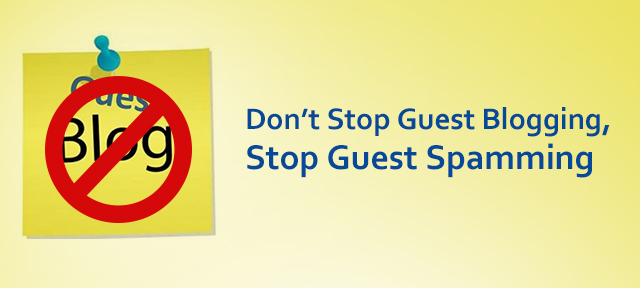Guest blogging has been a terrific way to build links back to your own website, as well as to establish yourself as an expert in your field. However, as is the case with practically all methods of link-building that are designed to increase page ranking on Google and other search engines, the “bad apples” have begun to spoil the barrel for the rest of us, who are marketing responsibly
Matt Cutts, the infamous head of the Webspam team at Google, threw the entire guest blogging community into an uproar recently when he posted an article called The Decay and Fall of Guest Blogging for SEO, which starts out with this gem:
“Okay, I’m calling it: if you’re using guest blogging as a way to gain links in 2014, you should probably stop. Why? Because over time it’s become a more and more spammy practice, and if you’re doing a lot of guest blogging then you’re hanging out with really bad company.”
Wow. That’s pretty insulting to those of us who are doing it correctly – but unfortunately, we seem to be a dwindling minority of online marketers.
According to Cutts, most guest bloggers these days are simply spammers, and are using their “posts” only to put links out to increase pagerank. There is no attempt to do any branding, convey information, establish oneself as an authority, or actually provide any value to the reader.
He cited an example of a clueless marketer who had approached him about posting on his blog, offering “suitable compensation” for permitting the marketer to submit a guest-post in return for a “dofollow link or two in the article body.” Matt pointed out not only the absurdity of this offer, but also the fact that it quite clearly violates Google’s quality guidelines.
He didn’t say that anything definite would be happening immediately in terms of Google actually “punishing” these spammers, but he did predict this:
“Given how spammy it’s become, I’d expect Google’s webspam team to take a pretty dim view of guest blogging going forward.”
Cutts has been discussing this issue for over a year now, and has published several videos on his blog about it, so this really should not come as a big surprise. A change to the algorithms is probably already in the works.
Spammers know what they are doing; they just choose to continue to use less-than-responsible methods of achieving their goals.
What Guest Blogging Should Be
Please do not think that guest blogging is completely dead. On the contrary, good guest blogging is now more important than ever. And if you’re not a spammer, you probably have nothing to worry about.
Guest blogging is done well when you write something that reaches a different audience than you normally reach, and when you provide value to the reader. You can build your reputation as an expert with good guest posts. If your post is informative and thought-provoking, it may also serve as an opportunity to generate new clients who may be interested in your product or service.
Your guest blog post should meet these criteria IN THIS ORDER:
- It should be relevant to the blog’s audience.
- It should be informative and helpful.
- It should only contain links that are relevant to the article and to the audience.
So keep these things in mind when you work on a guest-post campaign, and you should be just fine. Provide high-quality, original content that is useful to your readers. Be careful when using keyword links that are awkward in context. Use links judiciously and naturally – do not force a link where it really does not fit.
Target reputable sites rather than junk sites that post anything and everything. When choosing a site on which to publish, first review its current posts. Are they posts that you would not be ashamed to write? Would you publish them on your own site?
A guest post with quality, originality and authority on a well-respected website will do more for your traffic and your reputation than any number of spam links on low-quality sites.
Remember, spammy guest posts are like porn. It’s hard to define absolutely, but we all recognize it when we see it.
Simon is the founder and CEO of Simon’s Online Marketing, an online marketing agency focusing on sensitive and difficult niches. He is 27 currently, so that makes him an actual CEO under 30. If you are interested in reading more about his experience, you can check out his personal blog as well.
Image Credit: www.e2msolutions.com





